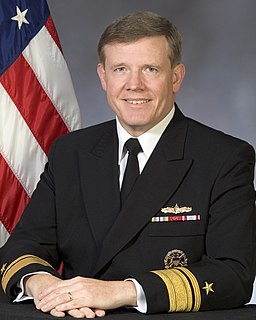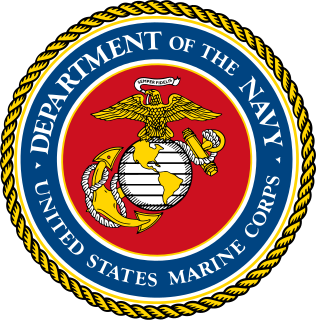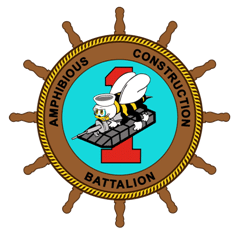
A service star is a miniature bronze or silver five-pointed star 3⁄16 inch in diameter that is authorized to be worn by members of the eight uniformed services of the United States on medals and ribbons to denote an additional award or service period. The service star may also be referred to as a campaign star or battle star depending on which award the star is authorized for and the manner in which the device is used for the award.

United States Marine Forces Special Operations Command (MARSOC) is a component command of the United States Special Operations Command (SOCOM) that comprises the Marine Corps' contribution to SOCOM. Its core capabilities are direct action, special reconnaissance and foreign internal defense. MARSOC has also been directed to conduct counter-terrorism and information operations.

1st Battalion, 4th Marines (1/4) is an infantry battalion in the United States Marine Corps based out of Marine Corps Base Camp Pendleton, California consisting of approximately 800 Marines and sailors. They fall under the command of the 1st Marine Regiment and the 1st Marine Division.

The 1st Battalion, 6th Marines (1/6) is an infantry battalion in the United States Marine Corps based in Camp Lejeune, North Carolina. It consists of approximately 1,100 marines and sailors. They fall under the command of the 6th Marine Regiment, the 2nd Marine Division of the II Marine Expeditionary Force.

Marine Wing Support Squadron 271 is an aviation ground support unit of the United States Marine Corps. They are based at Marine Corps Air Station Cherry Point, North Carolina. The squadron falls under the command of Marine Aircraft Group 14 and the 2nd Marine Aircraft Wing.

3rd Assault Amphibian Battalion is one of two active duty assault amphibian battalions in the United States Marine Corps. The battalion's primary weapon system is the Amphibious Assault Vehicle or AAV. The AAV is a 27.5-ton armored vehicle that carries up to 21 combat-loaded Marines and is armed with the UGWS, which mounts a .50 cal (12.7 mm) M2HB machine gun and a Mk-19 40 mm grenade launcher. The battalion is also equipped with the Amphibious Combat Vehicle or ACV, a rather new variant to the USMC’s amphibious armament which will replace the AAV in years to come. The AAV ACV are the only armored vehicles in the U.S. inventory that are fully capable of operations both on land and in the ocean. The battalion is part of the 1st Marine Division and the I Marine Expeditionary Force. The unit is based in Camp Pendleton, California.

Rear Admiral Robert Dunham Reilly Jr. was a United States Navy Surface Warfare Flag Officer who retired from active duty in January 2010 after 34-plus years of military service. His last assignment was as the 24th commander of the U.S. Navy's Military Sealift Command (MSC).

The 26th Marine Expeditionary Unit is one of seven such units currently in existence in the United States Marine Corps. It is an air-ground task force with a strength of about 2,400 personnel when at full strength during a deployment. It consists of four major parts: a command element, a ground combat element, an aviation combat element, and a logistics combat element. Since its establishment in the early 1970s as the 26th Marine Amphibious Unit, it has deployed extensively, and participated in numerous combat and contingency operations, as well as training exercises. The 26th MEU is based out of Marine Corps Base Camp Lejeune in the U.S. state of North Carolina.

Marine Aviation Logistics Squadron 13 (MALS-13) is an aviation logistics support unit of the United States Marine Corps. Known as the "Black Widows", it is currently based at Marine Corps Air Station Yuma, as part of Marine Aircraft Group 13 and the 3rd Marine Aircraft Wing.

The United States Marine Corps is organized within the Department of the Navy, which is led by the Secretary of the Navy (SECNAV). The most senior Marine commissioned officer is the Commandant of the Marine Corps, responsible for organizing, recruiting, training, and equipping the Marine Corps so that it is ready for operation under the command of the unified combatant commanders. The Marine Corps is organized into four principal subdivisions: Headquarters Marine Corps, the Operating Forces, the Supporting Establishment, and the Marine Forces Reserve.

Amphibious Construction Battalion ONE is an amphibious construction battalion in the United States Navy based in Coronado, California. Amphibious Construction Battalion TWO is its sister unit based in Little Creek, Virginia.

Mark William Balmert is retired United States Navy rear admiral. His last command was the joint Navy and Marine Corps Expeditionary Strike Group 3. He retired from the Navy in 2008 and joined Northrop Grumman as a Strategic Senior Consulting Manager.

The Marine Raider Regiment, formerly known as the Marine Special Operations Regiment (MSOR). The Marine Raiders is a special operations force of the United States Marine Corps, which is a part of Marine Corps Special Operations Command (MARSOC). Renamed for its predecessor, the World War II Marine Raiders, this unit is the principal combat component of MARSOC, which is the Marine Corps' contribution to the United States Special Operations Command (USSOCOM).

Major General Walter Lee Miller Jr. is a retired senior officer in the United States Marine Corps.

Joseph Leonard Votel is a retired four-star general in the United States Army who was commander of United States Central Command from March 2016 to March 2019. Before that, he served as commander of the United States Special Operations Command.
Harry W. Jenkins is a former major general in the United States Marine Corps.

Rear Adm. Jonathan Alex Yuen is a retired American admiral, who last served as the 47th Chief of Supply Corps and Commander of the Naval Supply Systems Command.
Jason Schauble is an American businessman and U.S. military combat veteran. As an infantry officer in the United States Marine Corps, Schauble led actions during the Iraq War that earned him the Silver Star, the Bronze Star with combat distinguishing device, and the Purple Heart.

The United States Special Operations Command is the unified combatant command charged with overseeing the various special operations component commands of the Army, Marine Corps, Navy, and Air Force of the United States Armed Forces. The command is part of the Department of Defense and is the only unified combatant command created by an Act of Congress. USSOCOM is headquartered at MacDill Air Force Base in Tampa, Florida.

Major General Peter John Talleri retired in September, 2013, after serving 34 years in the United States Marine Corps. At retirement, Maj. Gen. Talleri was the U. S. Marine Corps senior logistics professional in the Pacific. In 2013, he was also a recipient of the National Safety Council's “CEOs Who Get It” award.





















